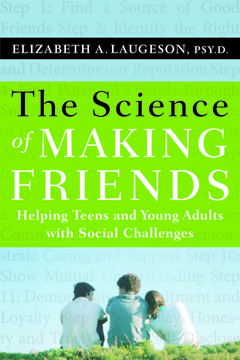The Science of Making Friends Helping Socially Challenged Teens and Young Adults
Auteur : Laugeson Elizabeth
Préfacier : Robison John Elder

The groundbreaking book that puts the focus on teens and young adults with social challenges
This book offers parents a step-by-step guide to making and keeping friends for teens and young adults with social challenges?such as those diagnosed with autism spectrum disorder, ADHD, bipolar, or other conditions. With the book?s concrete rules and steps of social etiquette, parents will be able to assist in improving conversational skills, expanding social opportunities, and developing strategies for handling peer rejection.
Each chapter provides helpful overview information for parents; lessons with clear bulleted lists of key rules and steps; and expert advice on how to present the material to a teen or young adult. Throughout the book are role-playing exercises for practicing each skill, along with homework assignments to ensure the newly learned skills can be applied easily to a school, work, or other "real life" setting. Bonus content shows role-plays of skills covered, demonstrating the right and wrong way to enter conversations, schedule get-togethers, deal with conflict, and much more.
- PART ONE: GETTING READY
- Ch. 1: Why Teach Social Skills to Teens and Young Adults?
- PART TWO: THE SCIENCE OF DEVELOPING AND MAINTAINING FRIENDSHIPS
- Ch. 2: Finding and Choosing Good Friends
- Ch. 3: Good Conversations: The Basics
- Ch. 4: Starting and Entering Conversations
- Ch. 5: Exiting Conversations
- Ch. 6: Managing Electronic Communication
- Ch. 7: Showing Good Sportsmanship
- Ch. 8: Enjoying Successful Get-Togethers
- PART THREE: THE SCIENCE OF HANDLING PEER CONFLICT AND REJECTION: HELPFUL STRATEGIES
- Ch. 9: Dealing With Arguments
- Ch. 10: Handling Verbal Teasing
- Ch. 11: Addressing Cyber Bullying
- Ch. 12: Minimizing Rumors and Gossip
- Ch. 13: Avoiding Physical Bullying
- Ch. 14: Changing a Bad Reputation
Epilogue: Moving Forward
DVD Contents vii
Foreword John Elder Robison xi
Preface xiii
Acknowledgments xv
About the Author xvii
Part One Getting ready
1 Why Teach Social Skills to Teens and Young Adults? 1
Part Two The Science of Developing and Maintaining Friendships
2 Finding and Choosing Good Friends 17
3 Good Conversations: The Basics 51
4 Starting and Entering Conversations 97
5 Exiting Conversations 121
6 Managing Electronic Communication 145
7 Showing Good Sportsmanship 179
8 Enjoying Successful Get-Togethers 199
Part Three The Science of Handling Peer Conflict and Rejection: Helpful Strategies
9 Dealing with Arguments 231
10 Handling Verbal Teasing 247
11 Addressing Cyber Bullying 267
12 Minimizing Rumors and Gossip 281
13 Avoiding Physical Bullying 307
14 Changing a Bad Reputation 323
Epilogue: Moving Forward 341
How to Use the DVD 348
Bibliography 349
Index 359
Elizabeth A. Laugeson, Psy.D., is a licensed clinical psychologist and assistant clinical professor of Psychiatry and Biobehavioral Sciences at the UCLA Semel Institute for Neuroscience and Human Behavior.
Date de parution : 09-2013
Ouvrage de 384 p.
15.2x22.4 cm
Thèmes de The Science of Making Friends :
Mots-clés :
teens with autism, young adults with autism, autistic teens and friends, autistic young adults and friends, ASD teens and friendships, ASD young adults and friendships, parents’ guide to teens with autism, parents’ guide to young adults with autism, parents’ guide to ASD teens, parents’ guide to ASD young adults, autistic, ideas for helping autistic teens, ideas for helping autistic young adults



